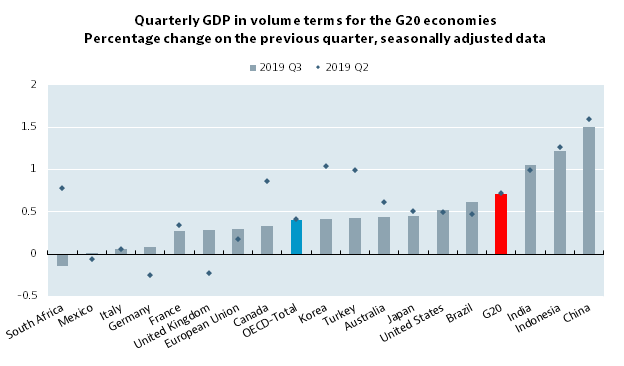GDP growth slows in most G20 economies in third quarter of 2019
Download the entire news release (PDF 120KB)
12/12/2019 - Growth of real gross domestic product (GDP) in the G20 area as a whole was stable at 0.7% in the third quarter of 2019, according to provisional estimates, but it slowed in the majority of G20 economies.
GDP contracted in South Africa (by 0.1%, following growth of 0.8% in the previous quarter). Growth also slowed significantly in Korea and Turkey (to 0.4%, from 1.0% in both countries) and Canada (to 0.3%, from 0.9%), more moderately in Australia (to 0.4%, from 0.6%), and marginally in China (to 1.5%, from 1.6%), Indonesia (to 1.2%, from 1.3%) and Japan (to 0.4%, from 0.5%).
GDP growth was stable in the United States, France and Italy (at 0.5%, 0.3% and 0.1%, respectively) in the third quarter of 2019 and picked up marginally in India (to 1.1%, from 1.0%), Brazil (to 0.6%, from 0.5%), the European Union (to 0.3%, from 0.2%), the United Kingdom and Germany (to 0.3% and 0.1%, respectively, after a contraction of 0.2% in each country in the previous quarter). GDP was unchanged in Mexico (following a contraction of 0.1% in the previous quarter).
Year-on-year GDP growth for the G20 area slowed to 2.9% in the third quarter of 2019, compared with 3.0% in the previous quarter, with China recording the highest growth (6.0%) and Mexico the lowest (minus 0.2%). Year-on-year GDP growth for the OECD area was stable at 1.6%.
Note: Growth rates presented in this chart are based on data with more than one decimal. |
Link to underlying data - Source: Quarterly National Accounts |
- Next publication date: 12 March 2019







